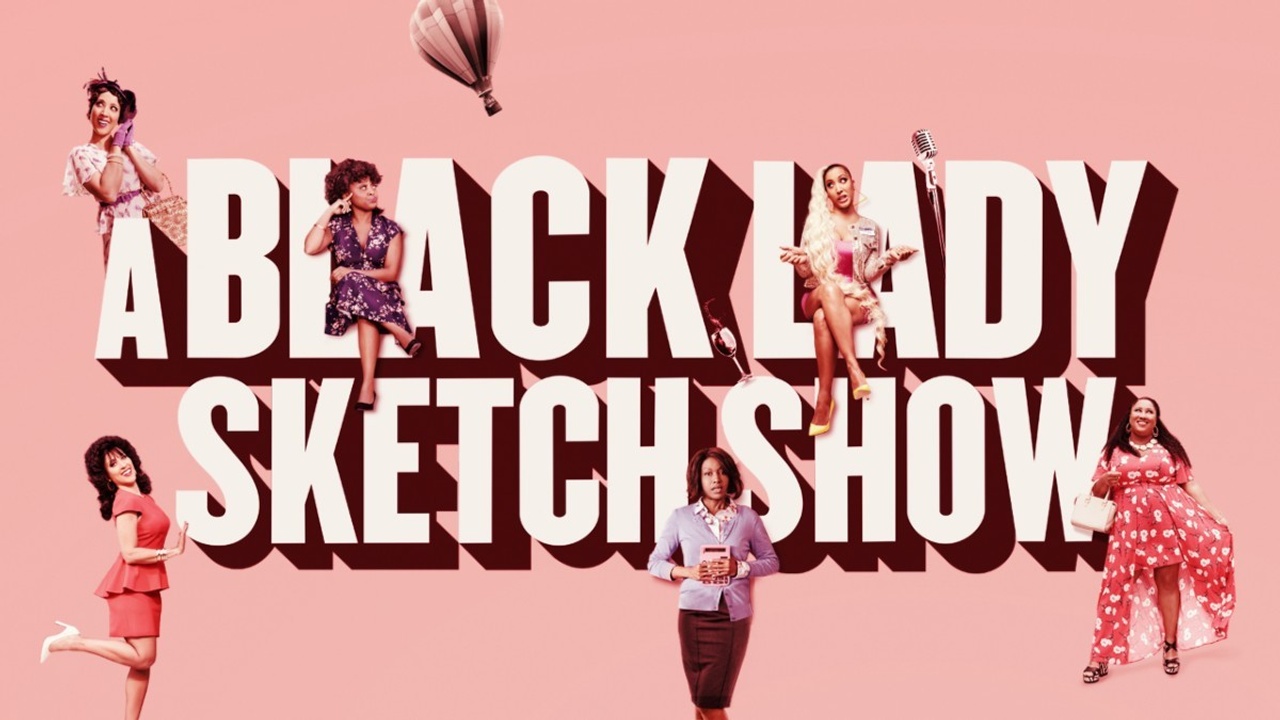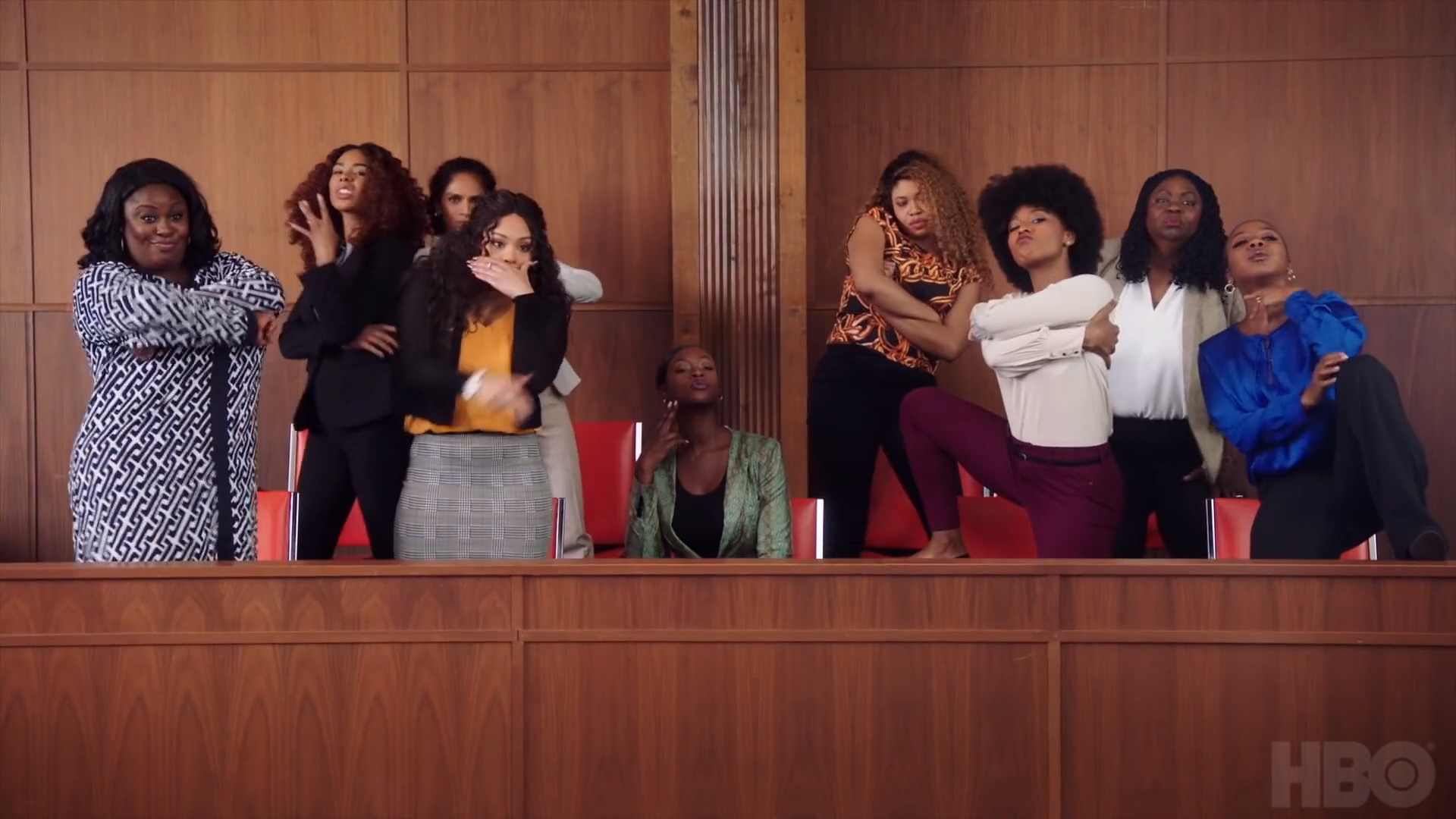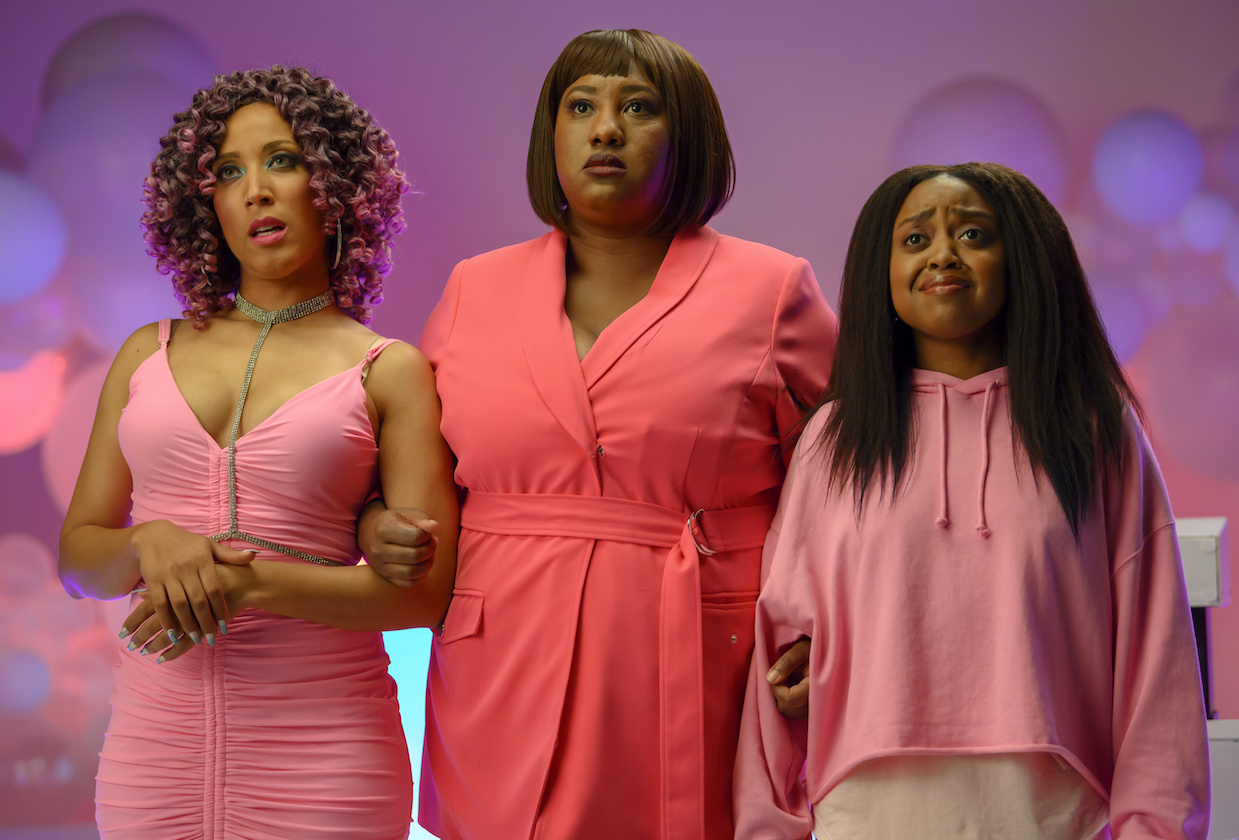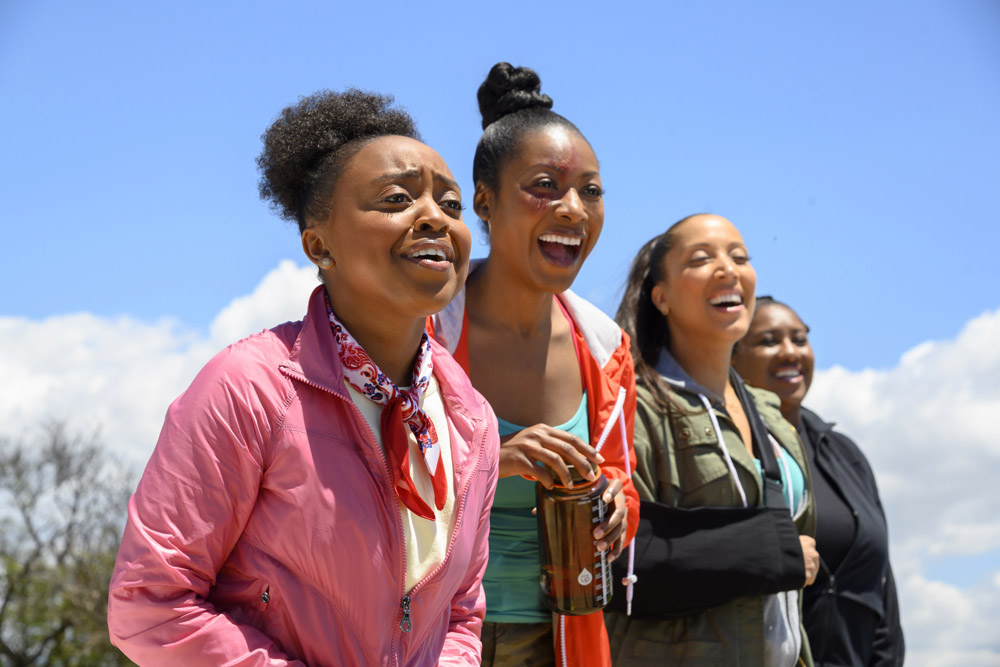Meet the Emmy-nominated Editors of "A Black Lady Sketch Show

Recently Filmmaker U was able to speak with the Emmy-nominated Editors of "A Black Lady Sketch Show." Editors Daysha Broadway, Jessica Hernández, and Stephanie Filo talk about their experience editing this comedic improvised hit show on HBO.
Daysha Broadway is a film & television Editor who has over 10 years experience working professionally in documentary, scripted, and unscripted television. A Los Angeles native, Daysha obtained a Masters Degree in Film Editing from Dodge College of Film and Media Arts at Chapman University. Her credits include numerous television shows such as "Insecure," "A Black Lady Sketch Show," "9-1-1," and The Lena Waithe produced "Twenties" and "Boomerang." In addition, she has contributed her talents to Documentary Features such as "Light Girls" for the OWN network, "Surviving R. Kelly" for Lifetime, along with various short films.
Daysha was awarded a Peabody for her work on "Surviving R Kelly" and has received Three Emmy-nominations for her editing on the A&E's "Born This Way" and HBO 's "A Black Lady Sketch Show."
Jessica Hernández is a first generation Cuban-American filmmaker whose work ranges from scripted television to documentaries and narrative features. Her films include: "Bomb It" (Tribeca 2007), "The Garden" (Oscar nom 2008), "Karma Calling" (Best Feature New Jersey Film Fest 2009), "Bhutto" (Competition Sundance 2010, Emmy nom, Peabody 2011), "Treatment" (Tribeca 2011), "The Punk Singer" (SXSW 2013), and "The Boy Band Con" (SXSW 2019).
Most recently Jessica has been working in scripted television. Her 2021 projects include Adam McKay’s Untitled "Lakers" series, Ava DuVernay's "Colin" in B&W and the Emmy nominated "A Black Lady Sketch Show."
Stephanie Filo is an Emmy and Peabody Award-winning TV/Film Editor and activist with over a decade of experience editing and producing both Scripted and Unscripted content. She is based in Los Angeles, CA and Sierra Leone, West Africa, and also serves on the board for Girls Empowerment Sierra Leone, a social impact and feminist-based organization for Sierra Leonean girls aged 11-16. She is one of the co-founders of End Ebola Now, an organization created in 2014 to spread accurate information and awareness about the Ebola Virus and its impact through artistic community activism.
Aside from editing television and film, with a passion for bringing a voice to social issues and telling stories of the under-represented, Stephanie spends much of her spare time producing and editing social action campaigns and documentaries, primarily focused on the rights of women and girls worldwide. Some of her notable campaigns include her work with the United Nations, International Labour Organization, and the Obama White House Task Force's "It's On Us" campaign to combat campus sexual assault. Her charitable work has been featured in Forbes Magazine, Entertainment Tonight, Telegraph UK, Yahoo, Al Jazeera, XWhy Magazine, and various others. Her work on the news documentary series "Mental State" earned her an Emmy-nomination for the episode "Aging Out" about youth aging out of the American foster care system. She earned an Emmy win for her editing on the Mental State episode "Separated" which covered ICE deportations, making herself and Nzinga Blake the first Sierra Leonean women to ever win an Emmy award.
Gordon Burkell (GB) - Today I'm joined by the editing team behind "A Black Lady Sketch Show," editors Daysha Broadway, Jessica Hernandez and Stephanie Filo. Welcome to the show. I noticed when I was reading up on this, you all have done a lot of documentary work in your careers. What brought you to a Sketch Show from your documentary work?
Jessica Hernandez (JH) - Oh, so many things I would say. I do think that all of us with the documentary work that that skill set became really helpful on a Sketch Show which has so many different genres. Because a documentary requires so much work to create the story in post. While we have a talented cast, we build a lot of the timing of the comedy in our cuts, and the documentary work definitely informs that.
GB - How do you break up the shows? When I think of a fiction show, the editing team is going to say okay, well you take episodes two and four, and you take one and three, but how do you do this? Do you do sketches individually? Then build the shows?

Stephanie Filo (SF) - As they're filming, we go sketch by sketch. Each of us will each take a sketch and then whatever is up next, it's like a free for all up until the point when all the sketches have been cut. And we've gone through all of our notes and processes. That's when Robin Thede and Lauren Ashley Smith will go through and decide what order each of the sketches should be edited in, what episodes they will go in, and what balance needs to be where.
DB - So much we have to cut for time or just because this joke is running a little long. Sometimes it just gets to that point. I know in Episode Three, there was a joke in "The Last Supper," which is a cut that Stephanie cut. And I know there's a joke in there that I'm sure was removed for time. But Gabrielle Dennis is literally asking you guys for drink and food tickets at "The Last Supper." And that's hilarious to me like the fact that you would need to leave a sacrificial lamb at the door. I was like it's the funniest joke ever. And so I literally cut the blooper reel at the end to leave enough time for that joke. I was like, this has to live somewhere. Some people have to see this. This is too funny. Yeah, it happens all the time and all of our sketches where we're just like, oh, that's okay to go. There's a sketch that I thought was really funny that no one will ever see. It didn't make the blooper reel. It's gone forever, but it lives in my heart. It might be on my desktop.
SF - Yeah, there's a lot of back and forth that ends up in the blooper reel like the black lady courtroom sketch. If you look at the bloopers at the end of that episode, it's all just like Robin Ed and Isa Ray walking in and Robin, basically roasting Isa every single time they walk in. So it's a pretty amazing run that would have been good if they could all be in the sketch but you can only take them.
DB - Especially because Lisa has no idea what Robin is gonna say until she says it and that's why she keeps breaking because it's just so unexpected.
JH - The actors' rhythms work together quite well. When I watch dailies their chemistry is really good. So even though they have different styles, they mesh very much in editorial, we're just trying to hit the jokes like rapid fire. So what we're doing is just trying to squeeze it as tightly as we can. But as far as their chemistry, it's right there. It's there to be had.
GB - And now what would you say is one of the more difficult aspects of working on a show like this for you in the editorial department?
DB - I think choices, honestly, because there are so many there are so many choices to make. As editors we choose takes, that's what we do. But on this show, because there is so much improv that is incorporated into it. I'm trying to decide which is the funnier joke, which one is going to land better? Which one works better for this moment, because sometimes it is which one's funnier and other times it is yes, that one's funny here, but this one works better for the moment. So you don't want to leave anything out. You want to make sure all the funniest jokes are in. And I think on the initial pass on our editors' cuts, that's usually my difficulty is that I want all of this but I have to make a choice.
GB - When I talk to editors, there's sort of two schools of thought. Some people follow the script or what's been laid out for them very religiously, and some say, no, this is my opportunity to show my story. How do you guys like to tackle your first cuts?
SF - One of the first things that Robin ever said to me was, it doesn't matter. Just make sure it's the funniest thing you can do and that really kind of resonated with me because even though you want to follow exactly what's written, they do so much amazing improv. Every take is hilarious. So it just comes down to what makes you laugh the most? And what fits into this style the most.
JH - I had one that I threw in that Robin didn't remember doing. She loved it. And I always feel like in this case, we know what the script is. We can go back to it. So why not show them something else? Because we can always return.
GB - When I talked to the editors of "Key and Peele" they said we knew it was working when Key was laughing through the whole thing. When you are screening and showing your edits to the ladies - are you guys stressed about that? What's that relationship like through the process?
DB - The first season I did not know it was working because everyone came in very with a professional manner. We're not going to laugh. We're going to look at these in a way that's like, you know what's working. And so we literally had to sit in a room with all the women, the writers and the producers and watch the sketches, and no one's laughing even if they think it's funny, they're not laughing because they're taking notes. I'm just in there, like, is working or am I fired? But the second season I think Robin and Lauren sort of gave themselves more permission to laugh. Let’s craft this sketch the way we really want it to be so that it is the most successful sketch, but also let’s just enjoy it and laugh. And trust us and trust the process. I remember Robin, being obsessed with the opening title sequence of Tired Dance Moves. Stephanie had done these split screens to fix a problem that we had, with the amount of people we could have in the room because of COVID restrictions. And I think that coming up with that solution made Robin go, okay, you know, this team is great. I don't have to worry about every little thing.This is a great team of editors, and they can handle it and if we have problems, they can find solutions. And this is funny, this is funny as hell, I'm enjoying the season.
SF - This season, we did it all remotely and screenings were through Evercast. If you're in a room with somebody, and you're playing it, even if they're sitting behind you, you can kind of feel like the energy drop, or you're like, Oh, this producer glanced at their phone, like I better punch up this moment. So it's interesting on Evercast, because you're just staring at people's faces and you're able to see all of their reactions. The only problem is sometimes there's a lag because you're online. So it's like, oh, did they laugh at the moment? Or did they laugh at like a moment that happened a couple seconds before. So that was one of the bigger, bigger things to get used to.
GB - Did you go to comedy clubs before? Or is comedy sketch just something fresh for you all?
DB - I can't go to comedy clubs or watch shows like "American Idol." Anytime someone's on a stage I'm afraid that they're going to bomb and I can't watch it. I've gone to like one comedy show. And I was like, thank God, this person was funny. It was Kevin Hart. Actually no one knew who he was at the time. And I was like, Okay, this guy's great. That's good. My heart was racing for this person. And so No, I have no background.

GB - As I mentioned at the start, you guys have all worked on other projects that are quite impressive. For example Daysha and Stephanie you worked on "Surviving R. Kelly," which is phenomenal. In a show like that, you guys really ramped up the tension. So how did you work with the material to get that out there?
DB - I worked on material that ended up in the first four episodes. There were other editors that worked on it, there were so many editors that worked on "Surviving R. Kelly." I think it was such a hard experience working with that material and trying to make sure that these women who had been victimized by this person, but also just want to tell the truth of the situation. I think at the time, none of the women knew each other and they were all telling the exact same story. I think we sort of approached it that if we're going to tell this story, we're not going to change it. We're going to completely let them speak. We can ramp up the tension, and build up to moments of reveals, but just not in a exploitive way. So many of the press and people on Twitter were already trying to discredit these women. We didn't want to be a part of that. We wanted to just let the story play out as much as possible. So the moments we chose to ramp up were very
calculated, we weren't gonna use crazy music, we weren't gonna do crazy sound effects and make it feel true crime or too contrived. We really just wanted to let these women speak.
SF - I think the stories ramp up themselves. There is already such terrible, terrible things that have happened to these women. For them to even be on camera, sharing this is a huge, huge endeavor above all else. So I think that all of us kind of just were really, really intentional in how we were using their words, because those words are so powerful. I remember Daysha and I constantly in each other's edit bays or with the other editors that we were working, constantly talking about have you seen this in this story? How does this tie in? Can we use this? That was like the ultimate collaboration, I think.

JH - For me, I go back and forth. But I love "Gang Retreat" and "The Girl That Cried Vintage" are my two favorites.
GB - Now the last question I like to ask everyone I interview because we've been stuck in this pandemic for so long. A lot of people turn to streaming services for entertainment. Is there a show or movie you discovered on the streaming services that you think people should check out?
JH - It's not brand new, but I caught it early and really loved "The Great" on Hulu.
SF - I just finished watching a miniseries called "The Third Day" on HBO and I like to binge through it in one sitting. It was so good.
DB - You're also very deep into "Pretty Little Liars" right now. And I know you don't want to do that. But I think you should tell people. I was very, very late to "Chernobyl." I binged it like in a day and it was phenomenal. There's also this Netflix documentary. I think it's called "Murder Amongst Mormons"? I love the way the editors and producers crafted that story. Because it doesn't come at you right away. They definitely just drop little hints along. It's like four episodes or something, maybe three. But they just drop a little hint and you think you're getting one story and then by the end it is a completely different story. So kudos to that whole team. It was very well done.
GB - Well, thank you all for letting me interview you.

